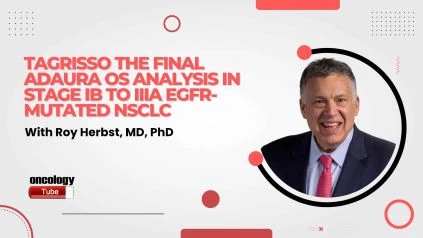Roy Herbst, MD, PhD, from the Yale Cancer Center and Yale School of Medicine, presented a groundbreaking abstract at the 2023 American Society of Clinical Oncology (ASCO) Annual Meeting.
The abstract, titled “Final ADAURA OS Analysis Reinforces Adjuvant Osimertinib as a Standard of Care for Patients With Stage IB to IIIA EGFR-Mutated Non–Small Cell Lung Cancer,” highlights the significant impact of adjuvant osimertinib in the treatment of patients with EGFR-mutated non-small cell lung cancer (NSCLC) in stages IB to IIIA.
The study presented by Dr. Herbst is based on the results of the ADAURA trial, which is a randomized, double-blind, phase III trial evaluating adjuvant osimertinib in patients with resected EGFR-mutated NSCLC.
The trial included patients with stage IB to IIIA disease who had undergone complete tumor resection. Osimertinib is a third-generation tyrosine kinase inhibitor (TKI) that targets EGFR mutations.
The updated analysis presented by Dr. Herbst demonstrated the overall survival (OS) benefits of adjuvant osimertinib in this patient population.
The results showed that patients who received osimertinib experienced a significantly longer OS compared to those who received placebo.
This finding reinforces the use of adjuvant osimertinib as a standard of care for patients with EGFR-mutated NSCLC in stages IB to IIIA.
The ADAURA trial had previously shown impressive disease-free survival (DFS) benefits with osimertinib, leading to the FDA approval of adjuvant osimertinib in March 2022.
However, the latest analysis adds to the growing body of evidence supporting the use of osimertinib by demonstrating its impact on OS.
This is a crucial finding as OS is considered the gold standard for measuring the effectiveness of cancer treatments.
The safety profile of osimertinib in the adjuvant setting was consistent with previous studies, with manageable adverse events.
The benefits observed in terms of both DFS and OS highlight the potential of adjuvant osimertinib to improve long-term outcomes and survival for patients with EGFR-mutated NSCLC.
Dr. Herbst‘s abstract reinforces the importance of molecular profiling in lung cancer patients, as it allows for the identification of specific mutations, such as EGFR mutations, that can be targeted with precision therapies.
EGFR-mutated NSCLC represents a subset of patients who can benefit greatly from targeted therapies like osimertinib.
In conclusion, Dr. Roy Herbst’s presentation at the ASCO 2023 Annual Meeting highlights the final OS analysis of the ADAURA trial, which solidifies adjuvant osimertinib as the standard of care for patients with stage IB to IIIA EGFR-mutated NSCLC.
These findings provide further evidence of the significant clinical benefits of osimertinib in improving survival outcomes for this patient population, supporting the use of targeted therapies in the adjuvant setting and emphasizing the importance of molecular profiling in lung cancer management.

